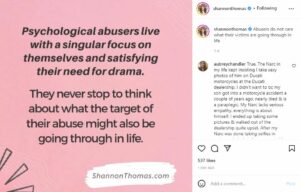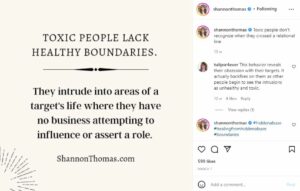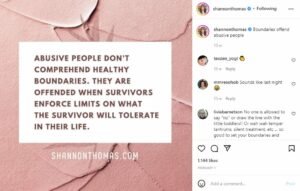Psychological abuse doesn’t leave bruises or cuts, but its wounds run much deeper. From signs of abuse to the steps on how to free yourself, Healthista finds out what you need to know
Recovery from any form of abuse can be a difficult journey. This is especially true when the mistreatment doesn’t leave any physical evidence of harm.
The cryptic nature of psychological abuse leaves people unable to even trust their own judgements. It involves repetitious mind games that are played on purpose by an abuser against his or her target.
The cryptic nature of psychological abuse leaves people unable to even trust their own judgements
Because of this, victims oftentimes do not trust themselves, or start to doubt whether the abuse was even real, and that can make healing a complex process.
If you have found yourself on the receiving end of psychological/narcissistic abuse, it is important to know that recovery is possible.
Healthista spoke to Shannon Thomas, author of Healing from Hidden Abuse: A Journey Through the Stages of Recovery from Psychological Abuse who tell gives Healthista her advice on how to heal from psychological abuse…

Signs of psychological abuse:
- Is the person chronically jealous or gets upset if you befriend or even speak to other people?
- Are you criticized for your life choices or personality where you were once highly praised?
- Do you find it difficult to explain how the relationship suddenly went from being soul-mates to chronic tension?
- Is silence or withdrawal used as methods to make you anxious or feel rejected?
- Did you go from being a confident person to having trouble making daily life decisions?
- Do you worry that you may not be strong enough to leave the relationship/friendship?
- Has your physical health deteriorated the longer you have been around the toxic person – including weight loss or weight gain?
- Is social media used to make you jealous of their connections to other people?
- Does the toxic person have a habit of denying saying or doing things that you clearly remember? Or accuse you of things that never happened?
- No matter how politely you try to approach issues in the relationship, are you accused of being ‘disrespectful’ or ‘aggressive’?
#1 Recognise your relationship/friendship as a rollercoaster ride
Having any sort of relationship with a toxic person is a lot like being on a rollercoaster.
There are wonderful, exhilarating highs, and then scary, sudden drops where you lose your breath and wait in anticipation for the highs to return.
Up and down, twist and turn, back and forth. Being an unwilling participant of an emotional rollercoaster is not fun. You have no idea when the relationship will, without warning, turn sour again.
Everything in you aches when the abuser shifts moods and you go from being connected to the other person, to intense drops that take your breath away.
Having any sort of relationship with a toxic person is a lot like being on a rollercoaster
When the abuser returns, you feel relief and can have fun again together.
Next time this happens, go find a picture of a large rollercoaster that has high peaks, steep declines and many twists and turns.
Print out the picture and write the name of your psychological abuser at the top of the page. Sit back and reflect on the fact that this relationship only follows this pattern of an ever-changing, twisting, environment.

#2 You know the truth, you don’t need to convince others
You most likely have witnessed a side of the abuser that no one else has seen, and people find it hard to believe when you try to explain it.
Psychological abusers often have a great public image and can even be leaders within the community.
They sometimes seek out high-profile employment, which works as an excellent mask to hide their abusive side even further.
In order to heal from being a target of psychological abuse, you need to remind yourself that even if no one ever sees what was done to you, it still occurred and you know that’s the truth.
And you know who else knows the truth? The abuser. They are keenly aware of the games they play with you, and the number of people they abused before you.
the abuser knows that you’ve seen the ugliest parts of them.
A very helpful grounding exercise is to write down five to ten moments in the relationship that help you recall the toxicity in each experience.
There’s no need to go into great detail on this list, just enough to remind yourself of exactly what you have dealt with in the relationship.
How is a list useful? When you begin to doubt yourself, going back to the list will help you re-centre and you will probably find yourself saying ‘that’s right, I forgot about that!’.
Survivors can’t forget or they will lose sight of the truth and healing.
#3 Stop making excuses for them
One of most difficult aspects of psychological abuse is that the abuser tries to get the victim to look at only one abusive episode at a time.
This is a calculated tactic because if you zero in on one moment at a time, you don’t realize how deep the abuse goes in the full picture.
Survivors of psychological abuse can struggle with the temptation to make excuses for the abuser when they try to come back and attack.
Stepping back and seeing the ‘storm’ is exactly what victims need to do. This brings the clarity needed to begin the recovery process.

#4 Keep note of their good days and bad days and a notable pattern will appear
Abusers have good moments and days when they do the right thing. When this happens, the key for victims to remember is that these positive times are an abuser just trying to trick you.
This does not wipe their slate clean of all the other terrible days.
If survivors are going to heal from the unhealthy bonding that happens in these toxic relationships, knowing that good days do exist is vitally important.
Otherwise, survivors will be confused by the scarce happy times in the relationship, and be tempted to only focus on the days they enjoy.
remind yourself that the toxic person will only stay enjoyable for periods of time
The best strategy for not being conned by the good days is to remind yourself that the toxic person will only stay enjoyable for periods of time.
Some abusers have a pattern of behaviours that can be identified. They may be able to hold it together for only a few days or weeks at a time.
The abuser becomes less attractive when you can predict the length of the good days or weeks, and then watch the abusive behaviours return again.
Try journaling about the cycle of abuse and the good days seem to follow. You will no doubt begin to see a pattern emerge. It always does.
#5 Remember – abusers know what they are doing even if it isn’t obvious
Targets of psychological abuse must come to terms with the question of whether the abuser knows what they’re doing.
Victims often will fall into the trap of believing this behaviour is all the abuser has ever known. Pity clouds judgement and prevents you from setting boundaries so you can heal.
Psychological abusers know the harm they inflict and do so because it is simply entertaining for them. Shocking, but true.
Abusers choose to systematically deconstruct the personhood of another individual knowing precisely the harm they’re causing.
Pity clouds judgement and prevents you from setting boundaries so you can heal
Wondering if the person you know behaves out of their free-will or their own wounds? Think about how they apologise and what lasting changed behaviours you see.
Free-will abusers give horrible apologies and sometimes, might not be willing to apologise at all and will never make lasting changes.
The key word here is lasting. Yes, they shape up and behave better for short spurts but that’s just until the dust settles in the relationship and then they return to their abusive baseline.
Free-will abusers rarely will complain about you till the cows come home and paint themselves out as the actual victim, but in the end are not capable of sustained self-reflection.

#6 Choose what boundary you will draw to place your abuser at a distance
Once a victim is able to come to terms with the truth that psychological abuse is done out of free-will, the next step is to determine what boundaries need to be put in place.
There are two different types of boundaries for this form of abuse:
The first is is what I call ‘detached contact’. This is exactly as it sounds, and it involves more than just limiting time with the abuser.
Detached contact is about the posturing of the survivor’s heart. With this type of boundary, there are still interactions with the abuser, but the tone is radically different than before the abuse was acknowledged.
No contact can also mean cutting ties with people who support the abuser
The heart of detached contact is the victim being in control their emotions and not being spun by the abuser. This is achieved by having rock solid clarity of who is abuser is and who they never will be.
The other form of boundary is called ‘no contact’. This happens when the victim closes all ability for the abuser to make contact.
That means blocking on social media, phone access and not engaging if they run into the abuser around town.
No contact can also mean cutting ties with people who support the abuser or who choose not to see the psychological abuse games being played.
No contact takes a great deal of willpower to begin the process of cutting contact, but once implemented and followed, survivors move forward into their healing and ultimately never regret setting the boundary.
#7 Create a visual collage on why you should move on from your abuser
If a target of psychological abuse wants to move forward and heal, they must begin to value the positive aspects of their life more than their connection with the abuser.
When survivors of abuse truly begin to find worth in the time they have in each day, their energy levels, emotional stability, financial security and physical health, the trauma bonding between the victim and abuser begins to unravel.
they must begin to value the positive aspects of their life more than their connection with the abuser
Creating a picture collage is a wonderful way for victims to remind themselves of what they could lose by continuing to be in this toxic relationship with the abuser.
The pictures may include personal goals they know will not be achieved or aspects of life that may be lost if they stay connected to this poisonous person.

#8 Would you treat someone the same way? Definitely not
Always remind yourself that the behaviours you’ve witnessed aren’t your fault. This form of abuse is confusing and can cause a victim to misinterpret the actions of the abuser.
One very helpful way to recognize the damage being done is for victims to ask themselves if they would say the things that have been said to them by the abuser.
Victims should take the time to reflect on how they have been treated
Victims should take the time to reflect on how they have been treated and ask the hard question of whether they can justify the treatment they have received, even though they wouldn’t treat other people the same way.
#9 Choose yourself, always
All survivors of psychological abuse must authentically grieve the positive aspects of the relationship with the abuser.
There will always be fleeting moments where you felt loved and connected or made you hopeful that the relationship could perhaps one day be healthier.
Why is this important? Without addressing what will be missed by leaving the relationship, a survivor cannot fully heal from the experience.
Choosing to value oneself over the demands of the abuser is a critical aspect to finding lasting recovery
Yes, there were good moments that can’t be ignored. However, those moments never lasted and were not sustainable as the norm in the relationship. Those times were like bubbles that would gently float in the air, only to be abruptly popped.
Recognizing the happier times and pausing to feel the loss of them will help you fully move forward and out of the toxic relationship.
Healing from hidden abuse may feel impossible but many other survivors of psychological abuse have walked the same path and have found restoration after an abusive relationship.
Choosing to value oneself over the demands of the abuser is a critical aspect to finding lasting recovery.
Shannon Thomas is a licensed clinical social work supervisor, the owner and lead therapist of an award-winning private practice-counseling agency in Southlake, Texas and author of Healing from Hidden Abuse: A Journey Through the Stages of Recovery from Psychological Abuse.
For more tips and information, visit shannonthomas.com.
Follow Shannon: Facebook, Instagram
More Healthista Content:
Adult Acne: expert reveals what causes it plus 7 important skincare tips
4 reasons you’re feeling low and how to combat it
Sugar cravings? 5 reasons your menstrual cycle could be to blame
5 reasons healthy eating has become SO complicated
4 protein myths you need to STOP believing
Stress symptoms? 7 instant fixes you can do at your desk
Like this article? Sign up to our newsletter to get more articles like this delivered straight to your inbox.



























































